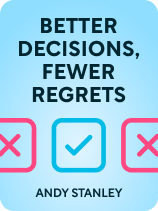

This article is an excerpt from the Shortform book guide to "Better Decisions, Fewer Regrets" by Andy Stanley. Shortform has the world's best summaries and analyses of books you should be reading.
Like this article? Sign up for a free trial here.
How do you make better decisions in life? Is there a way to make wiser choices?
To learn how to make better decisions, you need to question the biases that are influencing your decisions. There are four concrete strategies that you can use to develop better decision-making skills.
Learn what these four steps are and how you can make wiser choices.
How Do You Make Better Choices?
To guard against the tendency to tell yourself stories that aren’t true, courtesy of your cognitive biases, try deliberately structuring your decision-making around five questions. Each question can help you think more critically about the stories you tell yourself and push you to think more clearly about what decision you should make. Ahead, we’ll look at five methods for helping you learn how to make better decisions, each paired with a specific question that can help you push beyond a cognitive bias that tends to affect decision-making.
1) Stop Ignoring Information You Dislike
The first cognitive bias that we’ll address is the confirmation bias. Because of this error, we pay more attention to information that confirms what we believe (or what we want to believe) than to information that challenges our ideas. This means that when you’re facing an important choice, you naturally pay attention to the evidence that tells you you’re right—and dismiss all of the signals that there might be another way to look at the situation.
Ask: “Am I telling myself the truth?”
To counter your confirmation bias and stop ignoring useful information that disagrees with what you want to believe, think about whether you’re telling yourself the truth. To make better decisions, you often have to question your internal logic. By taking a hard look at whether you’re telling yourself the truth, you can gain more insight into the situation and why you’re seeing it the way that you are.
For example, you might believe that your spouse never helps around the house and you always have to do the chores. This would probably make you feel resentful and justified in starting an argument about it. But if you sit down and list who does what and how often, you might realize that your spouse is taking care of responsibilities you’d overlooked at first, like shopping for groceries, paying the bills, and repairing things that break. By asking whether you’re telling yourself the truth, you’re able to challenge your confirmation bias, appreciate your spouse’s contributions, and avoid making a rash decision to start an argument.
2) Think About the Future Instead of Focusing on Now
A second bias in our thinking makes us value what we want in the present more highly than what we’ll want in the future. Because of a cognitive tendency called focalism, we exaggerate the importance of what we’re focused on and let it block out everything else. Often, that’s the opposite of what we need to do to make a good decision.
Focalism explains that when we’re paying attention to a decision that affects us right now, we tend to forget that many other things will happen and affect our happiness and well-being in the future. When we make a decision, we usually aren’t methodically thinking through how the choices might play out. Instead, we’re influenced by our emotions: the emotions we feel in the present and the emotions we imagine we’ll feel if we make a particular choice. It’s natural to pick the option that will make us happier now, even though those decisions are sometimes the ones that will make us less happy or healthy later.
(Shortform note: Focalism—our tendency to overemphasize one piece of information—often trips us up, especially when strong emotions are involved. But physicist Leonard Mlodinow writes in Emotional that you really can’t keep your emotions from affecting your decisions. Feeling is just as important as thinking when you’re faced with a choice, and emotions help our brains choose what information to pay attention to and account for when making a decision. Still, Mlodinow writes that if your emotions run too high or linger too long, you can rein them in by expressing them, meditating, or “reappraising” the situation by looking for a more productive way to explain the events that prompted the emotion.)
Ask: “How does this fit into my story?”
Every decision you make becomes part of the story of your life. If you can take a step back from the present moment, you can consider how the decision you’re about to make could shape that story. You want to make decisions you’ll feel proud of, and this often requires trying to think about the future.
For example, imagine that you’re offered a high-paying job that requires working long hours. The salary would enable you to buy a new car or move into a bigger apartment. Those benefits might outweigh everything else in your mind. But if you ask yourself, “How does this fit into my story?”, you’ll remember that you want a balanced life, with time to spend with your family and friends and enjoy your hobbies. The benefit of higher earnings might not align with your desired narrative—which might lead you to rethink the job offer.
(Shortform note: The tendency to focus on the present instead of considering the future undermines our ability to make decisions, and other experts agree. Katy Milkman, author of How to Change, explains that we place too much emphasis on short-term concerns. But this isn’t just lazy thinking: The reason seems to be hard-wired into our brains. Neuroscientists note that the future is uncertain, and our brains don’t like to deal with uncertainty. The human brain evolved to keep us alive in the short term, so it finds certainty and a sense of control rewarding. That means that it’s stressful to face the uncertainty of the future—and as a consequence, we avoid thinking about the future as much as possible.)
3) Don’t Disregard Your Intuition
The third mistake in our thinking that we’ll discuss isn’t a cognitive bias, but instead is a logical error called the genetic fallacy. Because of this problem with our reasoning, we tend to dismiss certain pieces of information on the basis of where that information came from, thinking we’re justified in ignoring information from certain sources. One of the most harmful ways you use the genetic fallacy is to dismiss signals from your intuition.
(Shortform note: Intuition is a tricky concept to pin down. One definition comes from psychologist Seymour Epstein, who’s credited with coming up with dual-process theory (the idea that we learn, think, and make decisions with both an automatic system that learns from our experiences, and a rational system that relies on conscious deliberation). Epstein explains intuition as “the things we’ve learned without realizing we’ve learned them.” Intuition can be useful in some situations, like when an unfamiliar situation turns out to be very similar to ones we’ve experienced in the past, and not so useful in others, like when our past experiences aren’t particularly relevant to the current decision.)
Your intuition is an incredibly valuable source of information. When you get the feeling that something is wrong, that might be a clue from your intuition that the choice you’re about to make could have negative consequences for you or for other people. Or, that feeling might let you know that the choice you’re considering isn’t the decision that God wants you to make.
If you’re like most people, you often dismiss the feeling that something is off. Because we all think we can predict the future despite plenty of evidence to the contrary, you might even reassure yourself that everything will be fine or that you have the situation under control. Instead, you should stop and examine what your intuition is telling you.
Ask: “What am I ignoring?”
By checking in with yourself about whether your intuition is waving a red flag, you can cultivate the habit of listening to your internal knowledge about whether you’re making the right choice. For example, imagine that you’ve been dating someone who seems to check all the boxes: They’re attractive, successful, kind, and everyone around you likes them. However, you notice an unsettling feeling you can’t quite explain. You could dismiss your intuition. But if you ask yourself what you’re ignoring, you might dig deeper and discover that aspects of the relationship or the other person’s choices don’t fully align with your values—something you intuitively knew before you knew exactly why.
4) Stop Aiming Low With Your Behavior
A fourth flaw in our decision-making is the kind of black-and-white thinking where we assume that something is either wrong or right—and if an action isn’t obviously wrong, then it’s totally fine. We set standards for ourselves and how we’ll behave as partners, parents, friends, professionals, and people. However, we’re often lazy with our behavior, and we’re less concerned with reaching our highest standards than we are with just doing the bare minimum and meeting our lowest standards.
You might push the boundaries by telling yourself that it’s fine to watch one more episode on Netflix, have one more cocktail, or spend one more night working late—because these things aren’t technically against the rules you’ve set for yourself. But by deciding that it’s OK to do something just because it isn’t technically wrong, you’re giving yourself permission to aim low. It’s easy to slip into this kind of thinking because you live in a world where not everyone lives by the same standards you do. The world is very good at getting us to blur the boundaries we’ve set for ourselves.
(Shortform note: When we let ourselves off the hook, we indulge in what philosophy professor Thomas Wells calls “moral laziness.” Wells explains that we aspire to moral principles that we often fall short of. It’s easy for us to believe that some people are just more moral than we are and we can’t live up to their example or reach the standards we’d uphold in a perfect world. But philosophers like Søren Kierkegaard have contended that everyone knows the difference between right and wrong. Kierkegaard wrote that it’s not enough to admire other people’s goodness and settle for less in our own moral actions: We can’t talk our way out of living up to our standards, and we instead need to strive for goodness.)
Ask: “How can I act wisely?”
To hold yourself to higher standards, ask yourself how you can behave wisely as you make your decision. By thinking this question through, you can remind yourself about the goals you’ve set and the standards you aspire to, and see how your behavior can carry you closer or farther away from them. The wise decision might be to sacrifice something now so that you can achieve what you really want later. But the wise decision never involves blurring the lines of your moral or personal standards.
(Shortform note: To act according to your values, you have to be clear on what those values are. In The Subtle Art of Not Giving a F*ck, Mark Manson gives some advice for figuring them out. Manson writes that while we often can’t control what happens in our lives, we can choose the standards we live by. To do this, Manson advises developing a very clear idea of what you value. He recommends cultivating the habit of identifying the emotions you’re feeling, then asking yourself or a therapist why you feel the way you do. Then, you can identify the values that underlie your emotions: the ideas of success that you judge yourself against.)
5) Look Beyond Your Individual Perspective
Finally, the fifth error in our thinking is our tendency to get stuck seeing things from our own perspective. When we focus entirely on our point of view, we miss the opportunity to think about how other people in our lives and communities are affected by the things we do. We also miss the chance to make a choice that respects and honors other people. In all our relationships, we can make decisions that will improve other people’s lives. We should do this not because it guarantees that the other person will put the same kind of effort into the relationship—it doesn’t—but because caring for other people is the one decision that we can always be certain is the right one.
Ask: “How can I act with love?”
You should think about what it would look like to act with love. He contends that love is an action, not just an emotion, and you have to choose to behave with love when you make decisions. You can make the intentional choice to respect others, treat them with kindness, and honor them and your relationship. For example, suppose you start volunteering at the public library and run into trouble with a librarian who’s critical of your work and skeptical about your commitment. Especially if you differ in age, race, or political views, you might write her off as someone you can’t understand. Or you could choose to act with love and make an effort to be kind to her and try to make her day easier each time you’re at the library.

———End of Preview———
Like what you just read? Read the rest of the world's best book summary and analysis of Andy Stanley's "Better Decisions, Fewer Regrets" at Shortform.
Here's what you'll find in our full Better Decisions, Fewer Regrets summary:
- What it means to make a "good" decision
- The three most common categories of bad decisions
- How to overcome your cognitive biases to make better decisions






